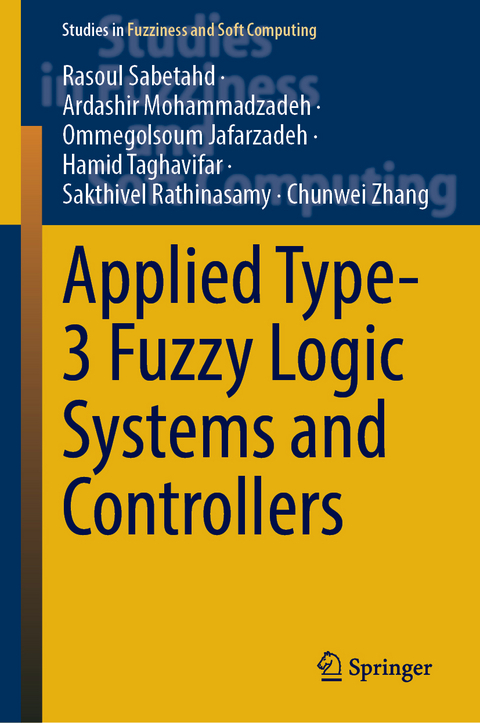
Applied Type-3 Fuzzy Logic Systems and Controllers
Springer International Publishing (Verlag)
978-3-031-75987-1 (ISBN)
- Noch nicht erschienen - erscheint am 24.01.2025
- Versandkostenfrei innerhalb Deutschlands
- Auch auf Rechnung
- Verfügbarkeit in der Filiale vor Ort prüfen
- Artikel merken
This book provides the fundamental approaches to designing and using type-3 fuzzy systems in real-world applications. Basic Matlab codes are provided to use type-3 fuzzy systems in a straightforward scheme. The main differences between type-3 fuzzy systems and other types are analyzed and compared. The effectiveness of type-3 fuzzy systems is analyzed and studied in various applications, such as robotics, intelligent control systems, and data science.
Rasoul Sabetahd was born in East Azerbaijan, Shabestar, Iran. He received B.S., M.S., and Ph.D. degrees in the field of civil-structural engineering in 2007, 2010, and 2022, respectively. He is currently an assistant professor at the Islamic Azad University of Sofian Branch, East Azerbaijan, Sofian, Iran. He has published many papers in most reputed journals. Dr. Sabetahd is the reviewer of several journals. His research interests include soft computing, control of structures equipped with intelligent systems, and fuzzy logic systems.
Ardashir Mohammadzadeh received his B.Sc. in July 2011 from Sahand University of Technology, Tabriz, Iran; his M.Sc. in September 2013 from K.N Toosi University of Technology, Tehran, Iran; and his Ph.D. in November 2016 from the University of Tabriz, Tabriz, Iran. Since December 2017, he has worked as an assistant/associate professor at the University of Bonab, Bonab, Iran. He joined the Shenyang University of Technology as a professor in 2022. He has published many papers in most reputed journals. Dr. Mohammadzadeh is an academic editor and reviewer of several journals. His research interests include control theory, fuzzy logic systems, machine learning, neural networks, intelligent control, electric vehicles, power systems control, chaotic systems, and medical systems.
Ommegolsoum Jafarzadeh was born in East Azerbaijan, Tabriz, Iran. She received B.S., M.S., and Ph.D. degrees in the field of civil-structural engineering in 2005, 2010, and 2022, respectively. She is currently a lecturer at the Technical and Vocational University (TVU), East Azerbaijan, Tabriz, Iran. She has published many papers in most reputed journals. Her research interests include soft computing, control of structures equipped with intelligent systems, and fuzzy logic systems.
Hamid Taghavifar is an assistant professor of mechanical engineering at Coventry University, UK. He obtained his Ph.D. in 2016 from Urmia University, Iran. His thesis primarily focused on leveraging nonlinear dynamics and data-driven controls to analyze and control complex dynamic systems such as autonomous vehicles and mobile ground robotics. He was awarded the Horizon Postdoctoral Fellowship from Concordia University in 2017. Following that, he joined Fiat Chrysler R&D Center in Windsor, Ontario, where he worked until 2019 on industry projects mainly around mechatronics and controls in automated driving. He has been with Coventry University and IFTC Research Center ever since, pursuing his research activities, teaching and supervising graduate students on industry-funded projects.
Rathinasamy Sakthivel received the B.Sc., M.Sc., M.Phil., and Ph.D. degrees in mathematics from Bharathiar University, Coimbatore, India, in 1992, 1994, 1996, and 1999, respectively. He served as a lecturer with the department of mathematics, Sri Krishna College of Engineering and Technology, Coimbatore, from 2000 to 2001. From 2001 to 2003, he was a postdoctoral fellow with the department of mathematics, Inha University, Incheon, South Korea. He was a research professor with the department of mathematics, Yonsei University, Seoul, South Korea, till 2006. He was a postdoctoral fellow (Brain Pool Program) with the department of mechanical engineering, Pohang University of Science and Technology, Pohang, South Korea, from 2006 to 2008. He served as an assistant and associate professor with the department of mathematics, Sungkyunkwan University, Suwon, South Korea, from 2008 to 2013. From 2013 to 2016, he was a professor with the Department of Mathematics, Sri Ramakrishna Institute of Technology, Coimbatore.
Prof. Chunwei Zhang was graduated from Harbin Institute of Technology in 2005. He is currently the chair distinguished professor at Shenyang University of Technology. He is the founding director of
Chapter 1. Theory and Application of a Novel Online Fractional-Order Learning Algorithm and an Interval Type-3 Fuzzy System.- Chapter 2. A Pragmatic Matlab Simulink and M-file for Robotic, Control, and Modelling Uses for an Applied Type-3 Fuzzy Logic System.- Chapter 3. Advancements and Applications In Modern Technology.
| Erscheint lt. Verlag | 24.1.2025 |
|---|---|
| Reihe/Serie | Studies in Fuzziness and Soft Computing |
| Zusatzinfo | Approx. 280 p. 45 illus. in color. |
| Verlagsort | Cham |
| Sprache | englisch |
| Maße | 155 x 235 mm |
| Themenwelt | Informatik ► Theorie / Studium ► Künstliche Intelligenz / Robotik |
| Technik | |
| Schlagworte | Battery Modeling • Boltzmann-Based Learning • Chaotic System • control system • Financial Systems • learning algorithm • Microgrids • Mobile Robots • Online Frequency Regulation • Online Learning • photovoltaic modeling • power management • Simulation • Solar Energy Systems • Type-2 Fuzzy Systems • Type-3 Fuzzy Systems • Uncertainty |
| ISBN-10 | 3-031-75987-7 / 3031759877 |
| ISBN-13 | 978-3-031-75987-1 / 9783031759871 |
| Zustand | Neuware |
| Haben Sie eine Frage zum Produkt? |
aus dem Bereich


